|
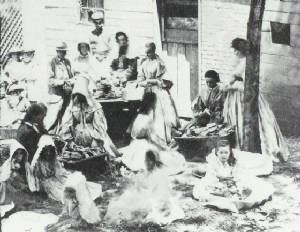
Regardless of their treatment of refugees, Texans made sure their troops were celebrated
and supported. As in other states, North and South, ladies’ societies were organized to supply the newly raised units
with flags and banners. Grand presentation ceremonies were conducted, barbeques held and dramatic speeches printed in the
newspapers.
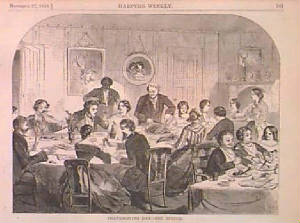
Early in the war, soldiers
traveling to posts east were feted with large suppers and fishing parties. As one soldier wrote “Day after day we were
dined, wined and flattered. Night after night we floated upon a sea of glory. The ladies petted and lionized us…”1
In 1861 the governor requested that the ladies of Texas begin forming aid societies
to support the troops and the ladies responded. Societies such as the Ladies' Needle Battalion of Austin sewed clothes
for Texas troops. One woman remembered "When the soldier boys wrote…[and asked] for more clothes, it was a hurry
up job. We would work almost night and day to make the cloth, then neighbor women would come and help cut and make garments."2
Other women were knitting socks, gloves, and scarves; even students
got into the act as illustrated by this article in the Austin State Gazette:
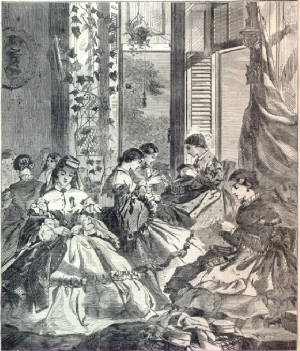
WORTHY
OF IMITATION.--We have been informed that Mr. B. J. Smith, principal, of the Austin Collegiate Female Institute, has established
a rule in his school, that each young lady shall knit six pairs of socks for our soldiers now in the field, and that he has
set aside a certain sum for the purpose of procuring woolen yarn for those who cannot furnish it themselves. This
is a praiseworthy undertaking, and, if carried out generally in all the other female seminaries in our State, would furnish
a large supply of a very necessary article in time for the next winter campaign, should the war last that long.
It will also, in addition, teach the young ladies a very valuable and important branch of their education.3
In Houston the top floor of the Telegraph newspaper office became
a sewing room where ladies were “…provided with a lot of sewing machines, and they meet there in parties, and
make up uniforms for the different companies. The uniforms are made of very common strong woolen goods
from the Penitentiary, each company in a particular color.”4
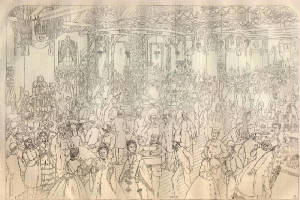
Fairs, tableaux, suppers,
auctions, concerts, and balls were held to raise funds for hospital supplies and other needed articles not easily home produced.
Even the 1861 inaugural ball, which was advertised as a calico ball, was used as an opportunity to raise funds for the troops.
It is interesting to note that the Governor did show up in a homespun suit as did several other gentlemen; however, the majority
of the ladies attended in silks.
In a few instances slaves from urban areas organized dances and
other entertainments to raise funds. In February 1863, two of the Maverick slaves, Betsey and Rosetta,
gave a patriotic super. The slave Betsey cooked a splendid supper with [figs?], turkeys, chickens, pie, cakes, and jellies.
However, the attendance must not have been satisfactory as Betsey requested to have a dance soon after. As reported by Mary
Maverick in a letter to her son Lewis “…they danced in the dining room till broad day light. She has made over
$100 which I will send to Cushing for the Bryan hospital. I value it much as coming from the negroes…”5
On another occasion in 1862 the black
population of Houston gave a ball to raise funds for sick soldiers.
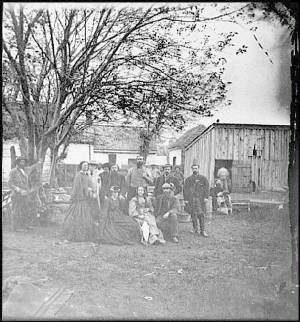
The ladies of Texas also felt it their duty to provide emotional
support for the troops. Hospital visits, including prisoner hospitals, and letter writing, even to non-relations, were encouraged.
Sallie McNeil of Brazoria County wrote in her diary “The ladies of the vicinity visited the soldiers twice….I
wasn't included to visit soldiers, but wanted to deliver things & call on 'the boys.' We must risk the displeasure
of the volunteers, for the camp is not a fit place for ladies!”6
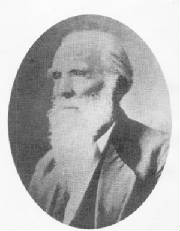
Individuals and communities
also provided assistance through soldiers’ homes or provided shelter and a free meal. Gideon Lincecum apparently provided
food and shelter to soldiers throughout the war. In 1862 he wrote, “The protracted drought and the heavy bearing of
the war has rendered us too poor to take or think of taking pleasure now. But we submit cheerfully to the privation, and more,
we are laboring daily to scrape up something to render comfortable the hundreds of worn-down soldiers who are every day stopping
with us.”7 Then in 1864 “I
have fed away nearly four good crops of corn and bacon to the soldiers and have not as yet made any of them pay a Cent.”8
|
|
1 Galladay, B.P. Dark
Corner of the Confederacy: Contemporary Accounts of the Lone Star State in the Civil War. University of Nebraska Press,
1994, page 108 2 Enstam, Elizabeth
York. Women and the Creation of Urban LIfe: Dallas Texas 1843-1920. Texas A&M
University Press, College Station, 1998, page 31 3
Austin State Gazette. February 4, 1863, page 1 column 2 4 Ibid. July 6, 1861, page 2 column 2 5 Marks, Paula Mitchell, ed. When
Will the Weary War Be Over? The Civil War Letters of the Maverick Family of San Antonio. Book Club of Texas, Dallas,
pages 61-62 6 Raska, Ginny McNeill
and Mary Lynne Gasaway Hill. The Uncompromising Diary of Sallie McNeill 1858-1867.
Texas A&M University Press, 2009, page 114 7
Lincecum, page 196 8 Ibid, page
318
|

